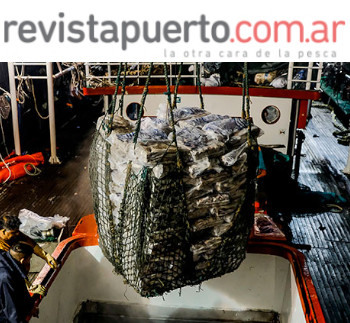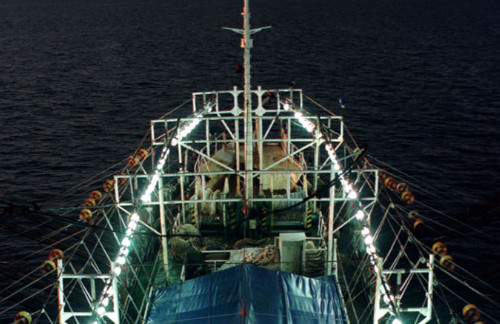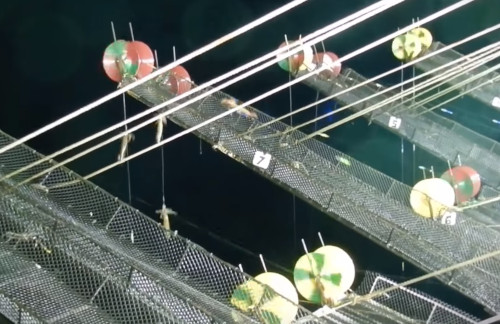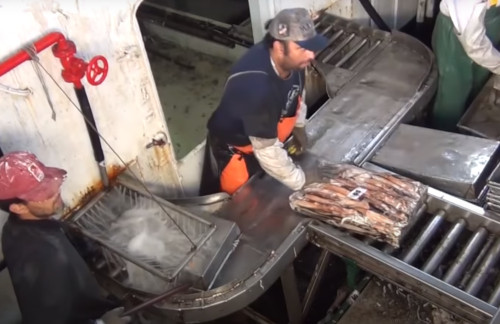|

Image: Revista Puerto / FIS
Squid: The average yields of the jigging fleet were reduced by 25 percent
 ARGENTINA
ARGENTINA
Friday, March 24, 2023, 01:10 (GMT + 9)
INIDEP presented the harvest data up to March 20 at the meeting of the Fishery Monitoring Commission. The average catch is 19 tons per day with 68 jigger boats in the fishing zone. Last year there were 72 vessels and they registered 24 tons per day. The cancellation of the research campaign in the Northern Management Unit was confirmed.

Photo: CAPA
The meeting of the Commission for the Monitoring of the Squid Fishery that was held yesterday at the Federal Fisheries Council with the presence of references from the shipbuilding chambers, the advisers themselves and INIDEP researchers, served to know the tangible figures of the performance of a harvest that appeared to be less abundant in relation to last year.
The meeting between the shipowners and managers with officials and researchers also served to confirm that the investigation campaign in the Northern Management Unit is cancelled, as anticipated by this medium last week, due to the impossibility of having the "Holmberg" and the return of the "Angelescu" outside the date required by the Cephalopod Fisheries Program, such that the data is useful.
INIDEP presented the evolution of catches and yields in the authorized area. Until March 20, 68 jigger boats made 150 trips with 56,843 tons, with an average of 19 tons per day. The catch of the trawling fleet was 6,590 tons.
In comparison with last year, the decrease not only affects the volume but also the operational boats that the harvest has. As of March 18, 2022, week 11 of the season, there were 72 jiggers operating. Said fleet had caught 66,309 tons (average of 24 tons per day). The catch of the trawling fleet remained stable: 6,565 tons.
(1).jpg)
Image: Stockfile FIS
The researchers explained that in January and until mid-February the fleet fished for summer spawning on the intermediate shelf between 45º and 47º South. The catch was made up of small specimens with an average length of 209 millimeters and an average weight of 175 grams, mostly during reproduction and post reproduction.
Since mid-February, the fishing area has moved to the outer platform south of 47º Sur, where the catches were made up of larger specimens, in the order of 212 millimeters in average length, 284 grams in average weight, immature or in incipient maturity that were identified as from the South Patagonian stock.
Given the decrease in this stock, the fishing area was moved to rectangle 4460 where the catches were made up of small individuals (average size 206 millimeters and average weight 177 grams), mostly immature, corresponding to the North Patagonian Buenos Aires stock.

Image: Inidep
During the meeting, the researchers presented the data from the test with trawl nets carried out by the "Angelescu" and which determined the early opening of the North Management Unit. The INIDEP vessel made 5 hauls and obtained 53 kilos of very small squid. The fishing chambers requested that the opening be on April 1.
The cameras consulted about the investigative campaign that Liberman had promised before the sector to carry out in April with one of the INIDEP ships. The voyage was canceled due to the impossibility of the "Angelescu" being able to carry it out since she returns from Georgia in mid-April.
During the meeting, the possibility of carrying out other campaigns and/or surveys was also discussed, but INIDEP assured that the way to evaluate the availability of the resource is to carry out recruitment estimation campaigns, which take place at the beginning of February and at the beginning of April.

Image: Inidep
The companies requested that, given the rigidity of the dates to carry them out, they be given priority in the campaign scheme. In the INIDEP they assured that they were always planned on the required dates and when they were not done it was due to force majeure. These causes have varied in recent years, but all have to do with problems on research vessels.
The companies gave the Federal Fisheries Council a slap on the wrist when they asked to have reports on the evolution of the fishery every fortnight. In the last two meetings, the report was prepared by the scientific team led by Marcela Ivanovic, but for unknown reasons, it was not entered. The chambers also requested that the report on water temperature be attached.
Source: Revista Puerto
.jpg)
[email protected]
www.seafood.media
|



